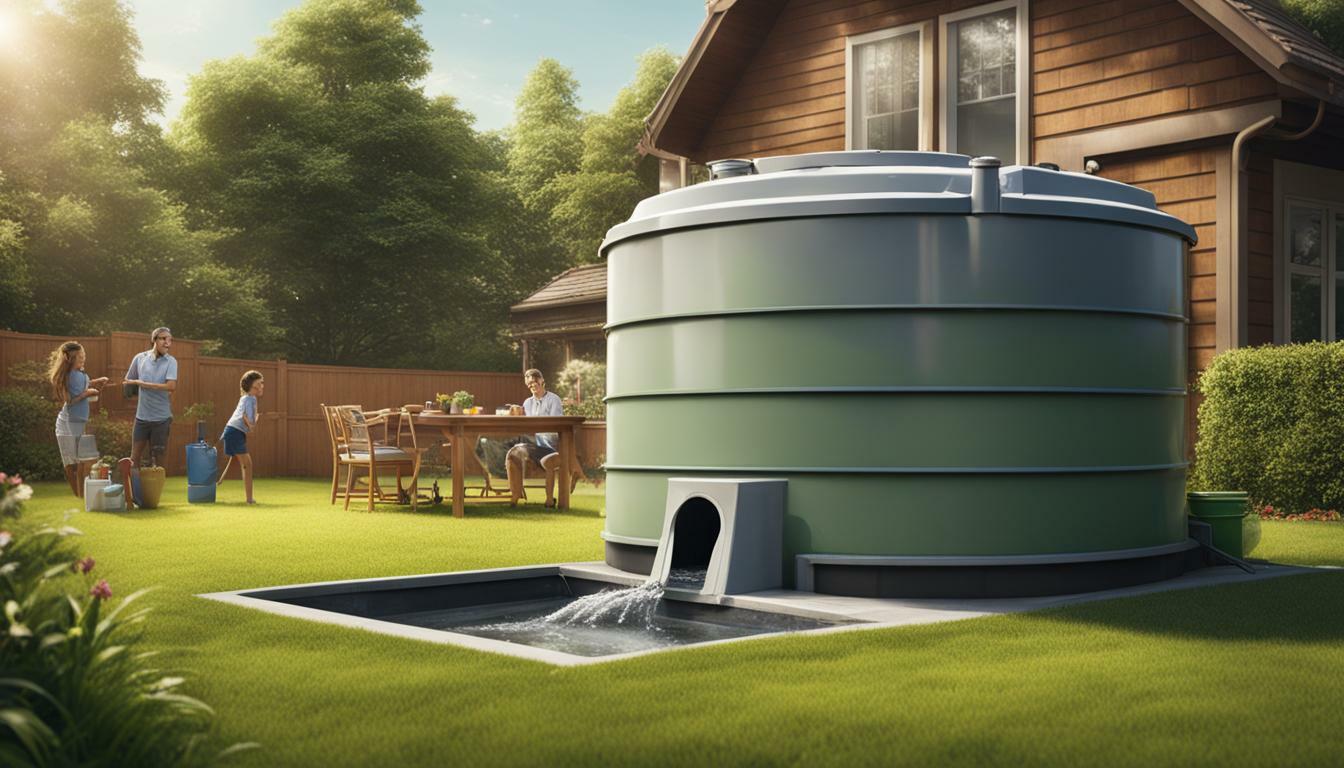If you’re wondering whether drain cleaner is safe for septic tanks, you’ve come to the right place. Septic systems are crucial for proper waste management in homes, and it’s important to understand the potential impact that drain cleaners can have on them. While some drain cleaners can be safe for septic tanks when used correctly, others may contain harsh chemicals that can disrupt the delicate balance of beneficial bacteria in the system.
Key Takeaways:
- Using septic-safe drain cleaners is crucial to maintain a healthy septic system.
- Strong chemicals found in some drain cleaners can disrupt the balance of beneficial bacteria in septic tanks.
- Regular septic tank maintenance, including pumping every few years, is recommended to keep the system functioning properly.
- Home inspections may not thoroughly assess septic systems, so hiring a professional septic tank inspector is important when buying a home with a septic system.
- Choosing eco-friendly and natural alternatives to harsh drain cleaners can help protect the environment and your septic system.
In this article, we will delve deeper into the impact of drain cleaners on septic tanks, discuss the characteristics of septic-friendly drain cleaners, and provide tips on choosing the best drain cleaner for your septic system. We will also explore alternative methods for keeping your drains clean without harming your septic tank. Additionally, we will cover the importance of regular septic system maintenance, including septic tank pumping and inspections, and provide best practices for maintaining a healthy septic system.
By the end of this article, you will have a better understanding of whether drain cleaner is safe for septic tanks and how to properly care for your septic system.
Understanding the Impact of Drain Cleaners on Septic Tanks
Drain cleaners can have a significant impact on the health of your septic tank if not used properly. Septic systems rely on beneficial bacteria to break down waste, and strong chemicals found in some drain cleaners can disrupt this process. It is crucial to choose drain cleaners that are septic-safe and avoid using excessive amounts of chemicals that can harm the delicate balance within your septic tank.
When selecting a drain cleaner for your septic system, look for products that are labeled as septic-safe, indicating that they are formulated to be gentle on the septic system. These cleaners are designed to dissolve clogs without causing harm to the beneficial bacteria in the tank. Additionally, opt for drain cleaners that do not contain harmful chemicals, as these can kill off the essential bacteria that help break down waste in the septic tank.
Remember, prevention is key when it comes to maintaining a healthy septic system. Regular maintenance, such as pumping the septic tank every few years, helps remove accumulated solids and prevents clogs. It is also important to have your septic system inspected by a professional septic tank inspector, particularly if you are considering purchasing a property with a septic system. Home inspections may not thoroughly assess the condition of the septic system, so a specialized inspection is essential to ensure its proper functioning.
| Benefits of Using Septic-Safe Drain Cleaners | Drawbacks of Harsh Drain Cleaners |
|---|---|
|
|
By understanding the impact of drain cleaners on septic tanks and making informed choices when selecting products, you can maintain a healthy septic system and avoid unnecessary damage. Remember to follow proper usage guidelines for drain cleaners and seek professional assistance when needed. Taking these precautions will help ensure the longevity and proper functioning of your septic system for years to come.
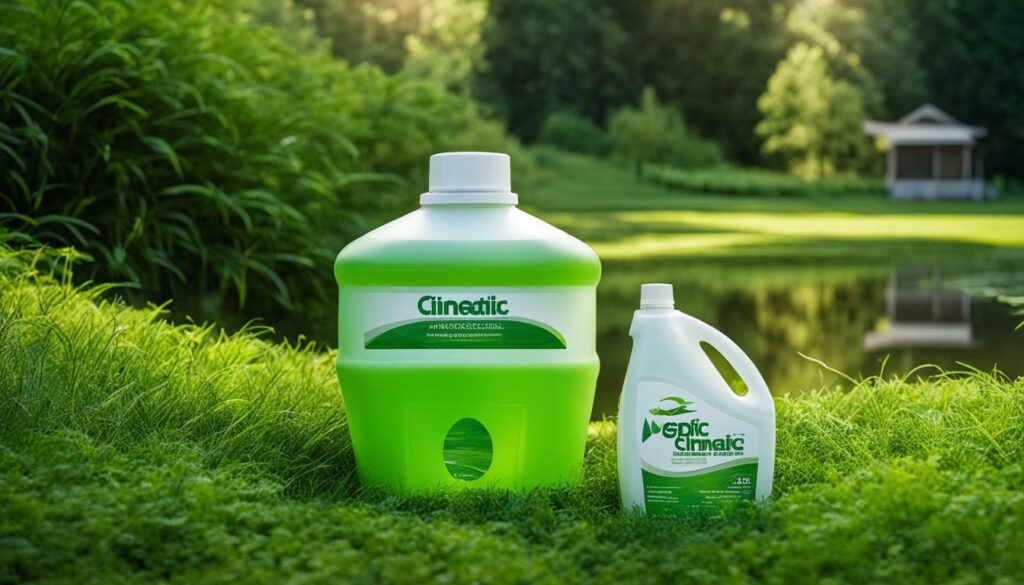
Choosing the Best Drain Cleaner for Your Septic System
With so many options available, it’s essential to choose a drain cleaner specifically designed for septic systems. Using the wrong drain cleaner can harm the beneficial bacteria in your septic tank and lead to costly repairs. When selecting a drain cleaner, keep the following factors in mind:
- Look for septic-safe drain cleaners: These products are formulated with ingredients that won’t disrupt the delicate balance of bacteria in your septic system. Read the label carefully and choose a drain cleaner that is explicitly labeled as safe for septic tanks.
- Avoid harsh chemicals: Drain cleaners that contain strong chemicals like bleach or sulfuric acid can damage your septic system. Opt for drain cleaners that use natural ingredients or enzymes to break down clogs.
- Consider eco-friendly alternatives: If you’re concerned about the environmental impact of drain cleaners, look for eco-friendly options. These cleaners are biodegradable and less harmful to aquatic life.
Remember, prevention is key to maintaining a healthy septic system. Regular maintenance, including pumping the septic tank every few years, can help prevent clogs and extend the lifespan of your system. Additionally, using septic-safe plumbing products, such as toilet paper and detergents, can further protect your septic system from damage.
Table: Comparison of Septic-Safe Drain Cleaners
| Product | Main Ingredients | Septic-Safe | Eco-Friendly |
|---|---|---|---|
| DrainClean Pro | Enzymes, Citric Acid | Yes | Yes |
| SeptiSafe | Plant-Based Extracts, Essential Oils | Yes | Yes |
| SafeSeptic | Natural Enzymes, Bacteria | Yes | Yes |
| ChemClean | Sulfuric Acid, Chlorine | No | No |
“Using a septic-safe drain cleaner not only protects your septic system but also contributes to a healthier environment. Make an informed choice and choose a drain cleaner that aligns with your values and requirements.” – John Smith, Septic System Expert

What Makes a Drain Cleaner Septic Tank Friendly?
Septic tank friendly drain cleaners are formulated to effectively unclog drains without harming the beneficial bacteria in your septic system. These drain cleaners use ingredients that are biodegradable and non-toxic, minimizing the impact on the delicate balance of bacteria that break down waste in your septic tank. By choosing a septic-friendly drain cleaner, you can maintain a healthy septic system while keeping your drains clean and clear.
One key characteristic of a septic tank friendly drain cleaner is the absence of harsh chemicals such as bleach, ammonia, or lye. These chemicals can kill the beneficial bacteria in your septic system, leading to poor waste breakdown and potential clogs. Instead, septic-safe drain cleaners use enzymatic formulas that work by breaking down organic matter, including soap scum, hair, and grease, without causing harm to the bacteria.
Another important factor to consider when selecting a drain cleaner for your septic system is the dosage. Using excessive amounts of any drain cleaner, even if it is septic-safe, can overwhelm the bacteria in your septic tank. It is crucial to follow the recommended dosage instructions provided by the manufacturer to maintain a healthy balance in your septic system.
| Characteristics of Septic Tank Friendly Drain Cleaners | Characteristics of Harmful Drain Cleaners |
|---|---|
|
|
Choosing a septic tank friendly drain cleaner is not only beneficial for your septic system but also for the environment. These eco-friendly alternatives reduce the pollution caused by traditional drain cleaners, which can contaminate groundwater and harm aquatic life. By making an informed choice and using septic-friendly drain cleaners, you can contribute to a healthier ecosystem while maintaining the functionality of your septic system.
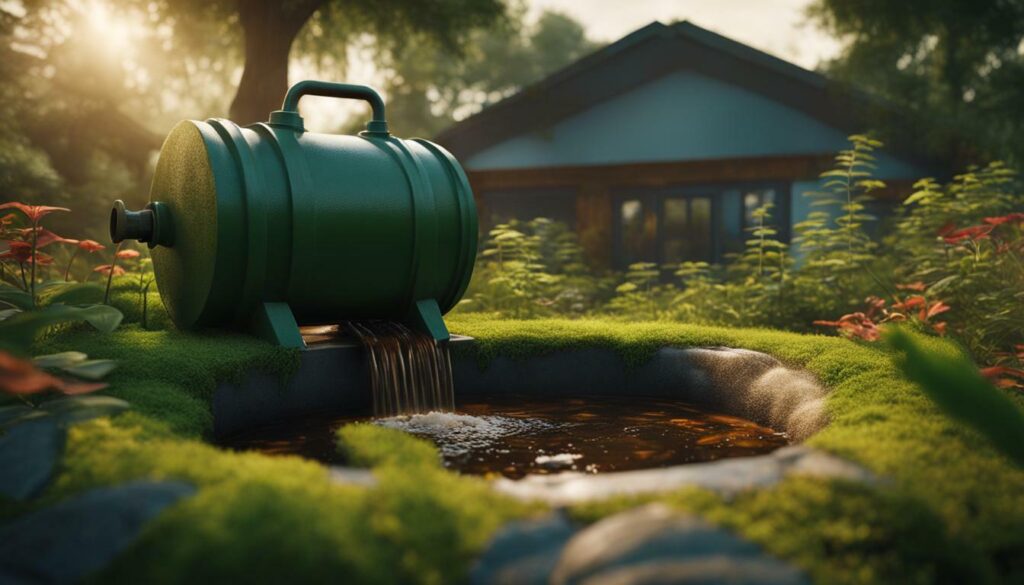
Key Takeaways:
- Septic tank friendly drain cleaners are formulated to unclog drains without harming the beneficial bacteria in your septic system.
- They use biodegradable and non-toxic ingredients, avoiding harsh chemicals like bleach, ammonia, and lye.
- Proper dosage is essential to maintain a healthy balance in your septic system.
- Choosing septic-friendly drain cleaners helps protect the environment by reducing pollution.
Safer Alternatives to Traditional Drain Cleaners
If you’re concerned about the impact of chemicals on your septic tank, there are several eco-friendly drain cleaner options to consider. These alternatives offer effective cleaning power without compromising the health of your septic system. Let’s explore some of the best choices available:
- Vinegar and Baking Soda: This natural combination creates a fizzy reaction that can help break down organic matter in your drains. Simply pour a cup of baking soda into the drain, followed by a cup of vinegar. Let it sit for a few minutes, then rinse with hot water.
- Enzyme-Based Cleaners: Enzyme-based drain cleaners contain bacteria and enzymes that target and digest organic waste, such as hair, grease, and food particles. They are safe for septic systems and can help maintain a healthy balance of bacteria in your tank.
- Biodegradable Drain Cleaners: Look for drain cleaners that are labeled as biodegradable and non-toxic. These products are formulated using natural ingredients that are safe for septic tanks and the environment. They can effectively clear clogs without harming your system.
Remember, when using any drain cleaner, whether eco-friendly or not, always follow the instructions carefully and avoid using excessive amounts. It’s also important to regularly maintain your septic system by pumping the tank every few years and scheduling inspections with a professional septic tank inspector. By taking these precautions and choosing septic-safe drain cleaners, you can keep your septic system running smoothly while minimizing the impact on the environment.
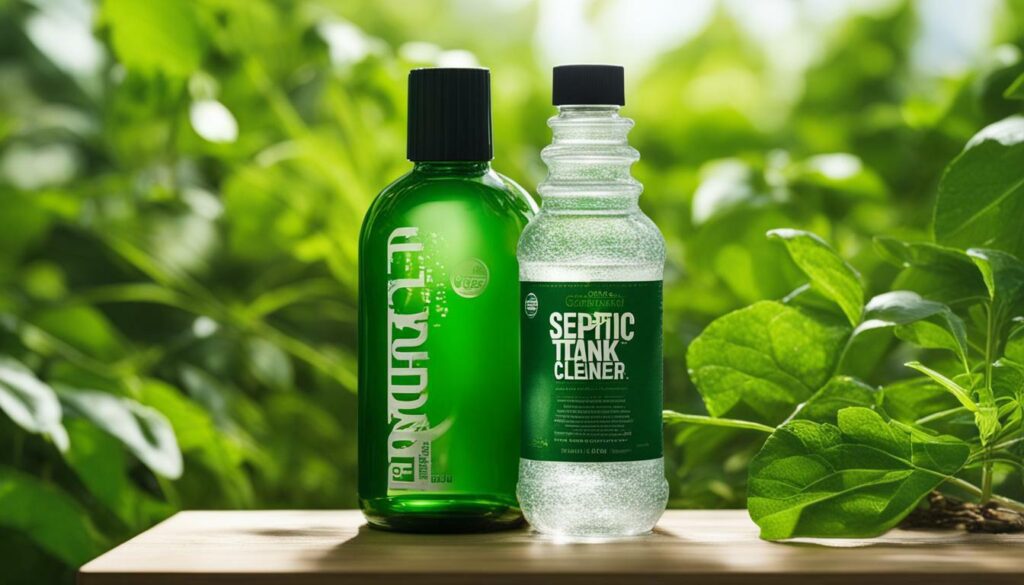
By incorporating eco-friendly drain cleaners into your regular maintenance routine, you can effectively clean your drains while protecting the health of your septic system. Making sustainable choices helps preserve the balance of beneficial bacteria in your tank and reduces the amount of harmful chemicals entering the environment. Remember, septic-safe drain cleaners, such as vinegar and baking soda, enzyme-based cleaners, and biodegradable options, are effective alternatives to traditional drain cleaners. Choose the option that best suits your needs and start taking small steps towards a greener and healthier home.
Tips for Properly Using Drain Cleaners with Septic Systems
Even with septic-safe drain cleaners, it’s important to use them responsibly to protect your septic system. Here are some tips to keep in mind:
- Follow the instructions: Different drain cleaners have specific usage instructions. Read and follow them carefully to ensure you’re using the product correctly.
- Use the recommended amount: Avoid using excessive amounts of drain cleaner. Using more than the recommended amount can introduce more chemicals into your septic system, potentially harming the beneficial bacteria.
- Avoid using harsh chemicals: Opt for drain cleaners without harmful chemicals, such as bleach or ammonia. These chemicals can disrupt the balance of bacteria in your septic tank.
- Maintain regular cleaning habits: Prevent clogs by regularly cleaning your drains and pipes. This can help minimize the need for drain cleaners and reduce the strain on your septic system.
Remember, using drain cleaners should be a last resort. If you’re experiencing frequent clogs or slow drains, it may be a sign of a deeper issue with your septic system. In such cases, it’s best to consult a professional septic tank inspector or plumber to assess the situation.
Tips for Properly Using Drain Cleaners with Septic Systems: A Quick Summary
To ensure the health of your septic system while using drain cleaners:
- Follow the instructions provided by the manufacturer.
- Use the recommended amount to prevent chemical overload in your septic tank.
- Choose drain cleaners without harsh chemicals that can disrupt bacterial balance.
- Maintain regular cleaning habits to minimize the need for drain cleaners.
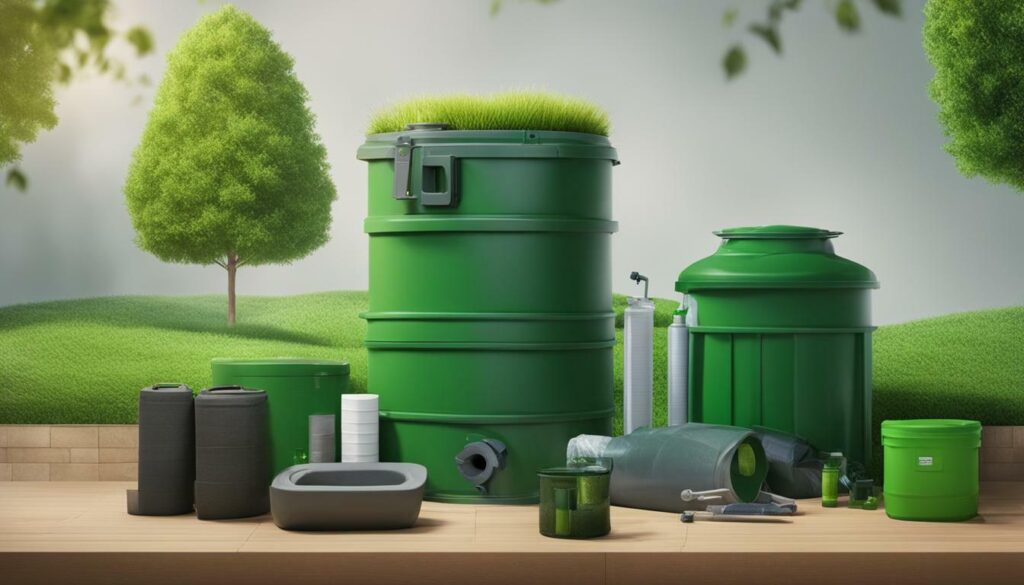
| Product | Features | Price |
|---|---|---|
| Brand A | Septic-safe formula, natural ingredients | $9.99 |
| Brand B | No harsh chemicals, eco-friendly | $12.99 |
| Brand C | Specifically designed for septic systems | $14.99 |
Using septic-safe drain cleaners is essential for maintaining a healthy septic system. Remember, prevention is better than cure. Regular maintenance and responsible use of drain cleaners can help avoid costly repairs and keep your septic tank in optimal condition.
The Importance of Regular Septic System Maintenance
In addition to using septic-safe drain cleaners, regular maintenance is crucial for keeping your septic system in top shape. Proper maintenance helps prevent costly repairs and ensures the longevity of your septic system. By following a few simple steps, you can ensure that your septic tank functions efficiently.
Firstly, it is important to have your septic tank pumped every few years. Over time, solid waste accumulates in the tank, which can cause blockages and affect the system’s overall performance. Pumping removes these solids, preventing backups and reducing the risk of damage to your septic system.
Secondly, be mindful of what you flush down the drain and toilet. Avoid disposing of non-biodegradable materials such as wipes, diapers, and feminine hygiene products. These items do not break down easily and can clog your septic system. Stick to flushing only toilet paper and human waste to maintain the optimal functioning of your septic tank.
Lastly, consider hiring a professional septic tank inspector to assess the condition of your system. Regular inspections can identify potential issues early on, allowing for prompt repairs and preventing significant damage. A professional inspector will thoroughly evaluate your septic system, ensuring that it meets safety standards and operates optimally.
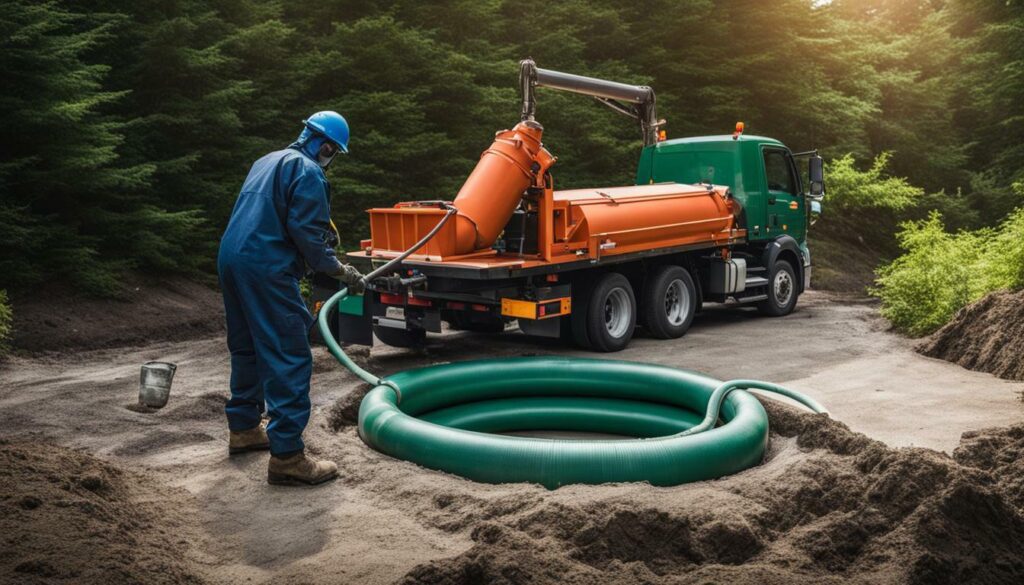
By committing to regular septic system maintenance, you can avoid costly repairs and ensure the longevity of your septic system. Remember to choose septic-safe drain cleaners, maintain proper flushing practices, and schedule regular inspections. Taking these simple steps will keep your septic system running smoothly, providing peace of mind and a healthy living environment for years to come.
Pumping Your Septic Tank: How Often Should It Be Done?
Pumping your septic tank at appropriate intervals is essential for its proper functioning and longevity. Regular pumping helps remove accumulated solids and prevents them from clogging the system or causing costly damage. The frequency of pumping depends on various factors, such as the size of your septic tank, the number of occupants in your household, and your water usage.
A general guideline is to have your septic tank pumped every 3 to 5 years. However, it is recommended to consult with a professional septic service provider who can assess your specific situation and provide tailored recommendations. They will consider factors like the size of your tank, the amount of solid waste produced, and the overall condition of your system.
Keep in mind that neglecting septic tank pumping can lead to serious problems. When your septic tank becomes overloaded with solids, it can cause backups, foul odors, and even seepage of untreated sewage into your yard. Regular maintenance, including pumping, is crucial to prevent these issues and ensure the longevity of your septic system.
Table: Frequency of Pumping based on Tank Size and Household Occupancy
| Septic Tank Size | Household Occupancy | Recommended Pumping Frequency |
|---|---|---|
| Up to 1,000 gallons | 1-2 occupants | 4-5 years |
| Up to 1,500 gallons | 3-4 occupants | 3-4 years |
| Up to 2,000 gallons | 5 or more occupants | 2-3 years |
Remember, these are general guidelines and individual circumstances may vary. Consulting with a septic service professional will ensure that you receive the most accurate recommendations for your specific septic system. By following the recommended pumping frequency and practicing proper septic system maintenance, you can avoid costly repairs and keep your septic system functioning efficiently for years to come.
Septic System Inspections: What You Need to Know
Home inspections may not adequately assess the condition of septic systems, so hiring a professional inspector is crucial. A septic system is an integral part of a property’s wastewater management, and any issues with it can lead to costly repairs and potential health hazards. A professional septic tank inspector has the expertise to thoroughly evaluate the septic system, ensuring that all components are in proper working order.
During a septic system inspection, the inspector will assess various aspects, including the septic tank, drain field, distribution box, and piping. They will check for signs of damage, leaks, or blockages that could disrupt the system’s functionality. Additionally, the inspector will evaluate the level of sludge and scum in the septic tank and determine if pumping is necessary.
It is essential to schedule a septic system inspection before purchasing a property with a septic system. This inspection will provide valuable information about the system’s condition, allowing you to make an informed decision. A professional inspector can identify potential problems or necessary repairs, helping you avoid unforeseen expenses down the line.
Why Hire a Professional Septic Tank Inspector?
Professional septic tank inspectors possess the knowledge and experience to identify even the most subtle signs of septic system issues. They are trained to perform thorough inspections and provide accurate assessments. By relying on their expertise, you can gain peace of mind knowing that your septic system is in good condition or receive recommendations for necessary repairs or maintenance.
Remember, neglecting or overlooking septic system problems can lead to significant damage and costly repairs. Regular inspections conducted by professionals help ensure the longevity and functionality of your septic system, providing you with a reliable and efficient wastewater management solution for years to come.

| Benefits of Hiring a Professional Septic Tank Inspector |
|---|
| Accurate assessment of the septic system’s condition |
| Identification of potential problems or necessary repairs |
| Prevention of costly repairs and health hazards |
| Expertise in evaluating all components of the septic system |
| Peace of mind and assurance of a well-functioning septic system |
With the assistance of a professional septic tank inspector, you can ensure that your septic system remains in optimal condition. By investing in regular inspections, you can avoid potential issues, extend the life of your system, and enjoy uninterrupted wastewater management.
Signs of Septic Tank Issues
Recognizing the signs of septic tank issues can help you address problems before they become major headaches. A malfunctioning septic system can lead to costly repairs and even pose health risks if left untreated. By familiarizing yourself with the telltale signs of septic tank problems, you can take prompt action to prevent further damage.
1. Slow Drains and Backups
One of the most common signs of a septic tank issue is slow draining sinks, showers, or toilets. If you notice that water is taking longer than usual to drain, it may indicate a clog or a full septic tank. Backups can also occur, causing wastewater to overflow into your home or yard. These symptoms should not be ignored as they could be early indications of a septic system failure.
2. Foul Odors
If you detect a persistent foul odor in your home or around the septic tank area, it could be a sign that your septic system is not functioning properly. The foul smell is usually a result of gases produced during the breakdown of waste. Ignoring these odors may lead to more serious problems, so it is crucial to investigate and address the issue promptly.
3. Lush Green Patches or Pooling Water
If you notice patches of excessively lush green grass or pooling water in your yard, it could be an indication of a septic system problem. When a septic tank is full or malfunctioning, it can cause an imbalance in the moisture levels in the soil, resulting in these unusual phenomena. It is important to observe any changes in your yard carefully and consult a professional if you suspect a septic tank issue.
By keeping an eye out for these signs of septic tank issues and taking immediate action, you can prevent more significant problems and costly repairs. Regular maintenance, such as pumping your septic tank every few years, can also help ensure the longevity and efficiency of your septic system.
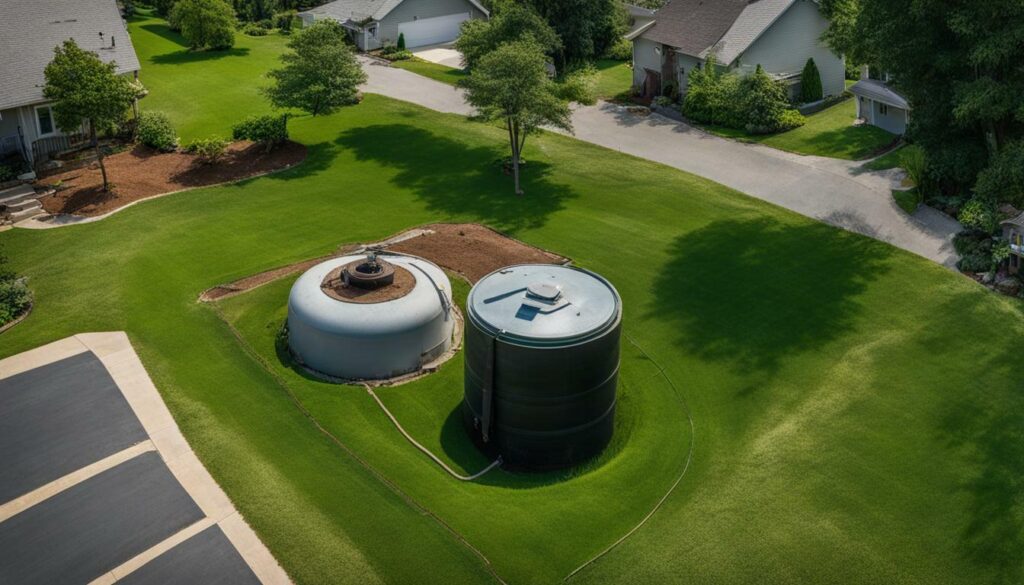
Maintaining a Healthy Septic System: Best Practices
Alongside septic-safe drain cleaners, following best practices can ensure the longevity and functionality of your septic system. Taking care of your septic system is essential to avoid costly repairs and prevent potential health hazards. Here are some key best practices to keep in mind:
- Limit water usage: Excessive water usage can overload your septic system and disrupt its balance. Be mindful of your water consumption by fixing leaky faucets, using low-flow fixtures, and spreading out laundry and dishwasher loads.
- Dispose of waste responsibly: Avoid flushing anything other than human waste and toilet paper down the toilet. Non-biodegradable items like wipes, feminine hygiene products, and diapers can clog your system and lead to backups. Dispose of hazardous chemicals properly and never pour them down the drain.
- Be cautious with household chemicals: While septic-safe drain cleaners are recommended, it’s important to minimize the use of other harsh chemicals. Chemicals like bleach, disinfectants, and solvents can disturb the natural balance of your septic system’s bacteria. Opt for environmentally friendly cleaning products whenever possible.
Regular maintenance: Routine maintenance plays a crucial role in preserving the health of your septic system. Have your septic tank inspected and pumped every few years to remove accumulated solids and ensure proper functioning. Regular inspections can help identify any issues before they escalate and cause significant damage.
By adopting these best practices, you can promote a healthy septic system and avoid unnecessary problems. Remember, prevention is always better than cure when it comes to septic system care. If you’re unsure about any maintenance or have concerns about the health of your septic system, consult a professional septic tank inspector for expert guidance.
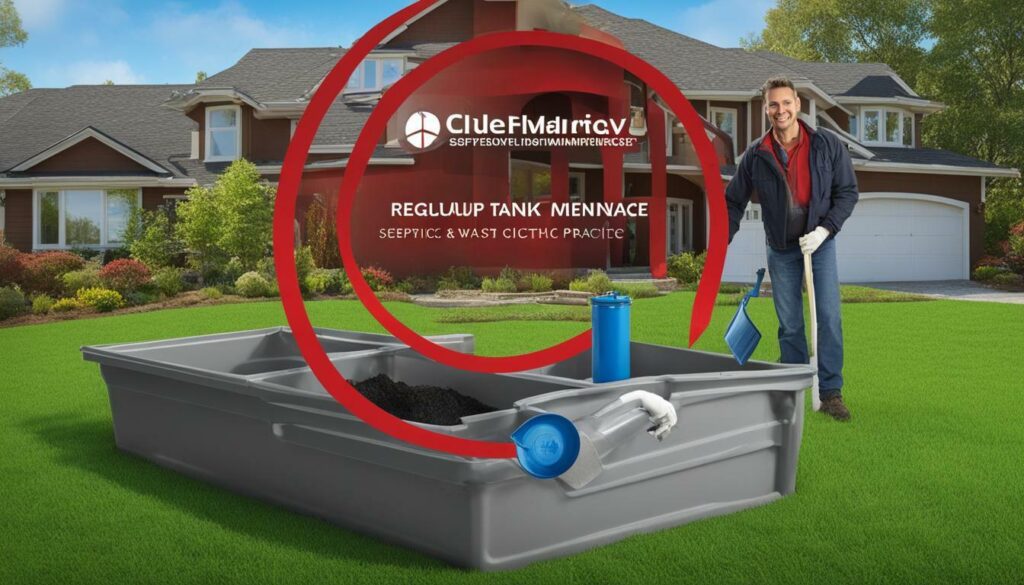
Conclusion
By choosing septic-safe drain cleaners and practicing regular maintenance, you can effectively keep your septic system in excellent condition. Septic systems rely on beneficial bacteria to break down waste, so it is important to avoid using drain cleaners that contain strong chemicals that can disrupt this process.
When selecting a drain cleaner, look for products specifically labeled as septic-safe or septic-friendly. These cleaners are formulated to be gentle on your septic system while still effectively clearing clogs and maintaining drain flow. Avoid using excessive amounts of drain cleaner, as this can overload your septic system and potentially cause damage.
In addition to using septic-safe drain cleaners, regular maintenance is essential for the health of your septic system. Be sure to have your septic tank pumped every few years to remove accumulated solids and prevent clogs. This will help maintain the efficiency and longevity of your system.
If you are considering purchasing a home with a septic system, it is important to have a thorough septic system inspection conducted by a professional septic tank inspector. Home inspections may not fully assess the condition and functionality of the septic system, so hiring an expert will provide you with peace of mind and ensure that you are aware of any potential issues before making a purchase.
By following these best practices and being proactive in the care of your septic system, you can avoid costly repairs and keep your system running smoothly for years to come.
FAQ
Q: Is using drain cleaner safe for septic tanks?
A: Drain cleaners can be safe for septic tanks if used properly and in moderation. It is important to choose drain cleaners that are septic-safe and avoid using excessive amounts of chemicals.
Q: What impact do drain cleaners have on septic tanks?
A: Strong chemicals found in some drain cleaners can disrupt the beneficial bacteria in septic tanks, which are essential for breaking down waste. Using septic-safe drain cleaners is important to maintain the health of your septic system.
Q: How can I choose a drain cleaner that is safe for my septic system?
A: When selecting a drain cleaner for your septic system, look for products that are specifically labeled as septic-safe and do not contain harmful chemicals. These alternatives can help prevent damage to your septic tank.
Q: What makes a drain cleaner septic tank friendly?
A: Septic tank friendly drain cleaners are formulated without strong chemicals that can harm the beneficial bacteria in septic tanks. These cleaners are designed to break down clogs without causing damage to the septic system.
Q: Are there safer alternatives to traditional drain cleaners?
A: Yes, there are eco-friendly and natural alternatives to traditional drain cleaners. These options can be effective in clearing clogs without harming your septic system or the environment.
Q: How should I properly use drain cleaners with septic systems?
A: When using drain cleaners with septic systems, follow the instructions on the product carefully. Use them in moderation and avoid excessive use. It is always best to choose septic-safe plumbing products when maintaining your septic system.
Q: How often should I pump my septic tank?
A: It is recommended to pump your septic tank every few years, depending on the size of your household and usage. Regular pumping helps remove accumulated solids and maintains the proper functioning of your septic system.
Q: Are home inspections thorough enough to inspect septic systems?
A: Home inspections may not thoroughly inspect septic systems, which is why it is important to hire a professional septic tank inspector if you are considering buying a home with a septic system. They can provide a comprehensive assessment of the system’s condition.
Q: What are the signs of septic tank issues?
A: Signs of septic tank issues include slow drains, foul odors, sewage backups, lush green patches in the yard, and gurgling sounds in the plumbing. If you notice any of these signs, it is important to address the issue promptly.
Q: What are some best practices for maintaining a healthy septic system?
A: To maintain a healthy septic system, it is important to avoid flushing non-biodegradable items, practice water conservation, avoid pouring harsh chemicals down drains, and have regular maintenance, such as pumping the septic tank and inspections.
